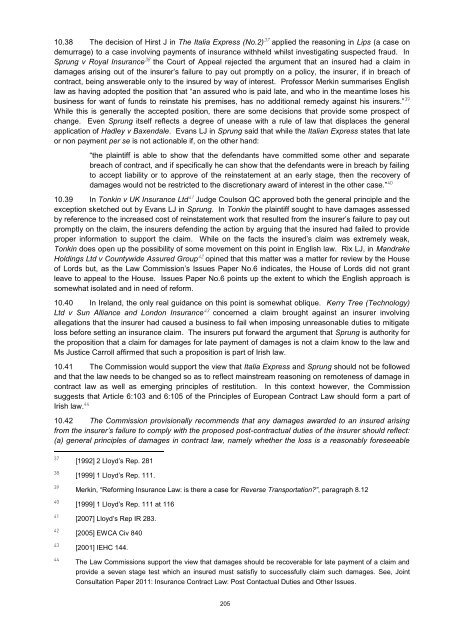Insurance Contracts CP - Law Reform Commission
Insurance Contracts CP - Law Reform Commission
Insurance Contracts CP - Law Reform Commission
You also want an ePaper? Increase the reach of your titles
YUMPU automatically turns print PDFs into web optimized ePapers that Google loves.
10.38 The decision of Hirst J in The Italia Express (No.2) 37 applied the reasoning in Lips (a case on<br />
demurrage) to a case involving payments of insurance withheld whilst investigating suspected fraud. In<br />
Sprung v Royal <strong>Insurance</strong> 38 the Court of Appeal rejected the argument that an insured had a claim in<br />
damages arising out of the insurer‘s failure to pay out promptly on a policy, the insurer, if in breach of<br />
contract, being answerable only to the insured by way of interest. Professor Merkin summarises English<br />
law as having adopted the position that ―an assured who is paid late, and who in the meantime loses his<br />
business for want of funds to reinstate his premises, has no additional remedy against his insurers.‖ 39<br />
While this is generally the accepted position, there are some decisions that provide some prospect of<br />
change. Even Sprung itself reflects a degree of unease with a rule of law that displaces the general<br />
application of Hadley v Baxendale. Evans LJ in Sprung said that while the Italian Express states that late<br />
or non payment per se is not actionable if, on the other hand:<br />
―the plaintiff is able to show that the defendants have committed some other and separate<br />
breach of contract, and if specifically he can show that the defendants were in breach by failing<br />
to accept liability or to approve of the reinstatement at an early stage, then the recovery of<br />
damages would not be restricted to the discretionary award of interest in the other case.‖ 40<br />
10.39 In Tonkin v UK <strong>Insurance</strong> Ltd 41 Judge Coulson QC approved both the general principle and the<br />
exception sketched out by Evans LJ in Sprung. In Tonkin the plaintiff sought to have damages assessed<br />
by reference to the increased cost of reinstatement work that resulted from the insurer‘s failure to pay out<br />
promptly on the claim, the insurers defending the action by arguing that the insured had failed to provide<br />
proper information to support the claim. While on the facts the insured‘s claim was extremely weak,<br />
Tonkin does open up the possibility of some movement on this point in English law. Rix LJ, in Mandrake<br />
Holdings Ltd v Countywide Assured Group 42 opined that this matter was a matter for review by the House<br />
of Lords but, as the <strong>Law</strong> <strong>Commission</strong>‘s Issues Paper No.6 indicates, the House of Lords did not grant<br />
leave to appeal to the House. Issues Paper No.6 points up the extent to which the English approach is<br />
somewhat isolated and in need of reform.<br />
10.40 In Ireland, the only real guidance on this point is somewhat oblique. Kerry Tree (Technology)<br />
Ltd v Sun Alliance and London <strong>Insurance</strong> 43 concerned a claim brought against an insurer involving<br />
allegations that the insurer had caused a business to fail when imposing unreasonable duties to mitigate<br />
loss before setting an insurance claim. The insurers put forward the argument that Sprung is authority for<br />
the proposition that a claim for damages for late payment of damages is not a claim know to the law and<br />
Ms Justice Carroll affirmed that such a proposition is part of Irish law.<br />
10.41 The <strong>Commission</strong> would support the view that Italia Express and Sprung should not be followed<br />
and that the law needs to be changed so as to reflect mainstream reasoning on remoteness of damage in<br />
contract law as well as emerging principles of restitution. In this context however, the <strong>Commission</strong><br />
suggests that Article 6:103 and 6:105 of the Principles of European Contract <strong>Law</strong> should form a part of<br />
Irish law. 44<br />
10.42 The <strong>Commission</strong> provisionally recommends that any damages awarded to an insured arising<br />
from the insurer‟s failure to comply with the proposed post-contractual duties of the insurer should reflect:<br />
(a) general principles of damages in contract law, namely whether the loss is a reasonably foreseeable<br />
37<br />
38<br />
39<br />
40<br />
41<br />
42<br />
43<br />
44<br />
[1992] 2 Lloyd‘s Rep. 281<br />
[1999] 1 Lloyd‘s Rep. 111.<br />
Merkin, ―<strong>Reform</strong>ing <strong>Insurance</strong> <strong>Law</strong>: is there a case for Reverse Transportation?”, paragraph 8.12<br />
[1999] 1 Lloyd‘s Rep. 111 at 116<br />
[2007] Lloyd‘s Rep IR 283.<br />
[2005] EWCA Civ 840<br />
[2001] IEHC 144.<br />
The <strong>Law</strong> <strong>Commission</strong>s support the view that damages should be recoverable for late payment of a claim and<br />
provide a seven stage test which an insured must satisfiy to successfully claim such damages. See, Joint<br />
Consultation Paper 2011: <strong>Insurance</strong> Contract <strong>Law</strong>: Post Contactual Duties and Other Issues.<br />
205

















